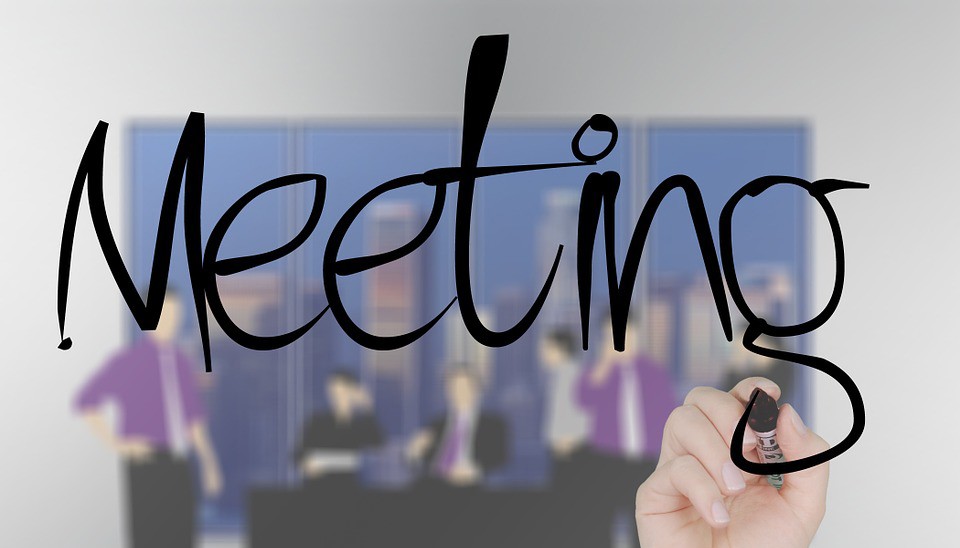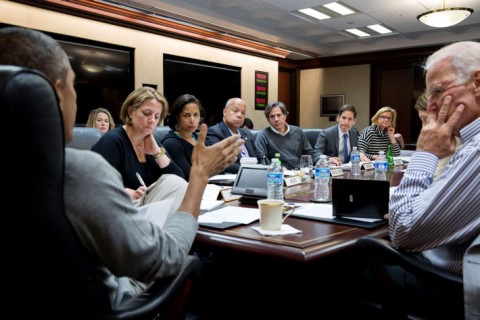
Photograph: Pixabay
Meetings with colleagues, clients and beyond are an inevitable part of entering the work force. They’re likely very different than the meetings you were familiar with in college — and Zila Acosta-Grimes CC’11, LAW’15 knows that it can be a tough transition. “Meetings can be the most creative and efficient way to accomplish a task, or leave you feeling like you’ve wasted your time.”
Try her tips to help you make the most of your next meeting.
Understand the meeting’s goal(s). Sometimes it’s a weekly staffing call or get-together, and the only purpose is to keep everyone updated. Sometimes it’s a brainstorming session and the goal is to get a group of diverse people together to come up with ideas. Knowing the goal of the meeting from the outset can give you insight into whether you should be participating or staying silent but taking notes, and how long the meeting should be.

Photograph: Wikimedia Commons
Recognize your role. Are you leading the meeting? Are you the most junior person in the room? Or somewhere in between? It’s important to understand if you are expected to just take notes or to be actively involved in the discussion. Sometimes it’s best to take your cues from others at your level, but I believe that asking someone you trust — who is slightly more senior and might have been in your position — will get you a more reliable answer.
Know your workplace. Some workplaces expect everyone to bring a laptop or tablet to every meeting and share notes, whereas other workplaces would frown on it. Some workplaces expect only senior people to sit at the conference table and juniors to sit at (or even set up) chairs surrounding the conference table. Other workplaces are flat and non-hierarchical. Take everyone’s advice with a grain of salt (even mine!) because it’s coming from their own experience in their specific department or environment. Context is everything.
Prep for every meeting. Regardless of the goal(s) of the meeting and your role, you don’t want to be caught flat-footed. Before the meeting, read the emails or documents being discussed and bring hard copies, or have them easily accessible. Bring extra copies for others and make sure to be on time, if not early.
Be engaged! Most people understand that frustration of being in a meeting that is going in circles and feels like a waste of time or is irrelevant to your job. However, it is important to maintain a good attitude, particularly as a junior staff member. Half of being a good employee is being engaged, which means being actively interested. Don’t look at your phone or doodle. Follow the conversation, make eye contact with the person talking, and ask questions (if appropriate) or follow up after the meeting. Also, take notes, even if it’s just for yourself. Just because no one told you to take notes doesn’t mean it won’t be expected on a call three weeks later.
Don’t talk to hear your own voice, but if you have an idea or a question, speak up. This is an opportunity to meet people, get face time with individuals you wouldn’t otherwise interact with and get context and information about issues that might become relevant.
Photograph: Pete Souza/The White House
It’s said that 90 percent of communication is non-verbal. Meetings are a great opportunity to get this crucial context and feedback. Discussions, feedback and context are often given in meetings but not formally distributed via email or memos.
Acknowledge others’ contributions. It can be frustrating to say something in a meeting, not get a response and then hear a colleague say the same thing and get recognized for it. If you find that frustrating, then you should not to do the same thing to others. For example, if your colleague Luis has a good idea and you would like to build on it you can say, “Building on Luis’ idea, I think we should ….” Be the colleague you’d like others to be.
Every meeting is an opportunity. Use these tips to make the most of them!

Zila Acosta-Grimes CC’11, LAW’15 is an associate at Debevoise & Plimpton, president emerita of Columbia College Young Alumni and a member of Columbia College Women. Previously, she worked at Goldman Sachs, the Manhattan Times and the MirRam Group, and was Lin-Manuel Miranda’s assistant. Acosta-Grimes also does immigration work pro bono and fundraises for political candidates.